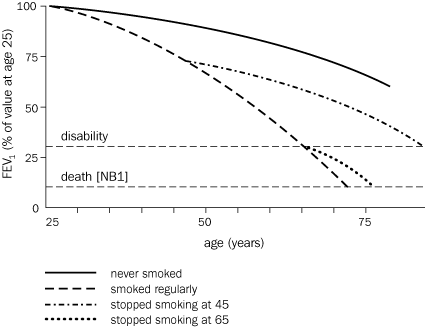Smoking cessation for COPD
Smoking cessation is the single most important intervention to prevent or limit lung damage in a patient with chronic obstructive pulmonary disease (COPD). For detailed information about smoking cessation, see here.
Tobacco smoking is the most common cause of COPD, and smoking cessation is the only intervention that has been shown to slow the progression of COPD (other than oxygen therapy in patients with severe hypoxaemia).
Smoking and loss of forced expiratory volume in 1 second (FEV1) with age illustrates the effect of smoking on lung function, and the benefit of stopping smoking.

NB1: Death in this figure refers to death with an underlying cause of irreversible chronic obstructive pulmonary disease, whether the immediate cause of death is respiratory failure, pneumonia, cor pulmonale or aggravation of other heart disease by respiratory insufficiency.
Adapted by permission from BMJ Publishing Group Limited. Fletcher C, Peto R. The natural history of chronic airflow obstruction. Br Med J 1977;1(6077):1645-8. [URL]
